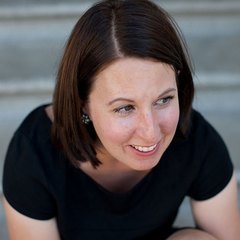|
Back
Another sampling from the current century Toronto
Koerner Hall
01/16/2019 -
Terry Riley: Half-Wolf Dances Mad in Moonlight
Dorothy Chang: Northern Star
Dinuk Wijeratne: First Winter
Jocelyn Morlock: Nostalgia
Emilie LeBel: They do not shimmer like the dry grasses on the hills, or the leaves on the trees [*]
Stewart Goodyear: Ur-
Stewart Goodyear (piano)
The Toronto Symphony Orchestra, Tania Miller, Simon Rivard [*] (conductor)

E. LeBel (© Philippa C Photography)
The Royal Conservatory’s 21C Music Festival, a 5-day blitz of contemporary music, returns for the sixth time, now relocated from the month of May to January to enable more RCM students to participate.
Also participating, at least for this opener, was the Toronto Symphony Orchestra, whose New Creations Festival is now history, although the TSO continues to pepper its regular season with new and recent works. Actually only about half the TSO was present (along with 14 students from the Glenn Gould School, the conservatory’s post-secondary division). The other half of the orchestra was playing an all-Mozart program at its usual home, Roy Thomson Hall.
The first item was a work dating from the past century (1985 – such an antique!), but by a star composer whose influence goes on and on: Terry Riley’s string orchestra version of his Half-Wolf Dances Mad in Moonlight. It turns out to be a mellow-sounding piece, with scurrying lines that move it along with dynamic changes in sonic weight. It seems to be working toward a definitive statement before melting away. Riley is here for the full festival; one of the eight concerts (Live at 85!) is devoted to his work.
We then heard two sections from a six part work by six composers, True North: Symphonic Ballet, commissioned by the Calgary Philharmonic Orchestra to help celebrate Canada’s sesquicentennial in 2017. Dorothy Chang’s Northern Star has deep rumbling sounds that evolve nicely into a shimmering evanescence building to a very high pitch. Dinuk Wijeratne’s First Winter attempts to express the response to the challenging habitat of the first humans to live in what is now Canada. It conjures up a careful transversal of a hazardous trek and, like so many works evoking a brooding northern landscape, ends up like a Sibelius symphony in capsule form.
Jocelyn Morlock’s Nostalgia for string orchestra (composed in 2007, revised in 2012) has as its “starting point” J. S. Bach.s Sonata for Viola da Gamba and Harpsichord, BWV 1027. It’s not a variation on the Bach work, but has its own yearning, melancholic trajectory, a bit reminiscent of Samuel Barber. For me, this 15-minutes work was the best realized piece of the evening.
Emilie LeBel’s They do not shimmer like the dry grasses on the hills, or the leaves on the trees (the quote is from Sheila Heti) is derived from her solitary experiences crossing large areas of the North American prairies. This was its world premiere (Ms LeBel is Affiliate Composer with the TSO) and it requires a large orchestra. It begins with airy textures and drifts dreamily along. On first hearing it failed to leave much of a sense of itself, but would be happy to hear it again.
The evening ended with another premiere: Stewart Goodyear’s piano concerto Ur-. It has a double inspiration: Goethe’s Metamorphosis of Plants in which he theorized that all plants have descended from an original ur-plant, and Anton Webern’s concise, highly-distilled Symphony Op. 21, a kind of ur-symphony.
Mr Goodyear hinted at a degree of displeasure in being limited to a 12-minute length (which is awkwardly short for a concerto, which typically occupies the centrepiece of a concert.) (Some years ago R. Murray Schafer drew attention to the trend of short commissions by titling a work No Longer than Ten (10) Minutes. Good point.) The work begins with the most dissonant phrases heard all evening. The pianist has a lot of nimble fingering to do, in fact it’s rather playful in a somewhat jazzy way. There is some byplay with piano and trumpet, and a fast-slow-fast structure. I wonder if he wants to expand the work or leave it as is? I hope the TSO makes room for it and Ms LeBel’s piece for further exposure in their regular series. It would be a shame of they received only this single hearing.
Michael Johnson
|